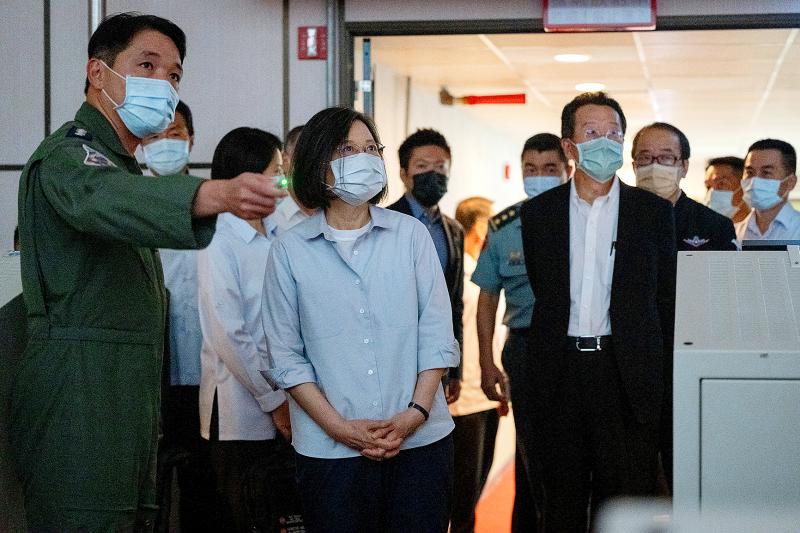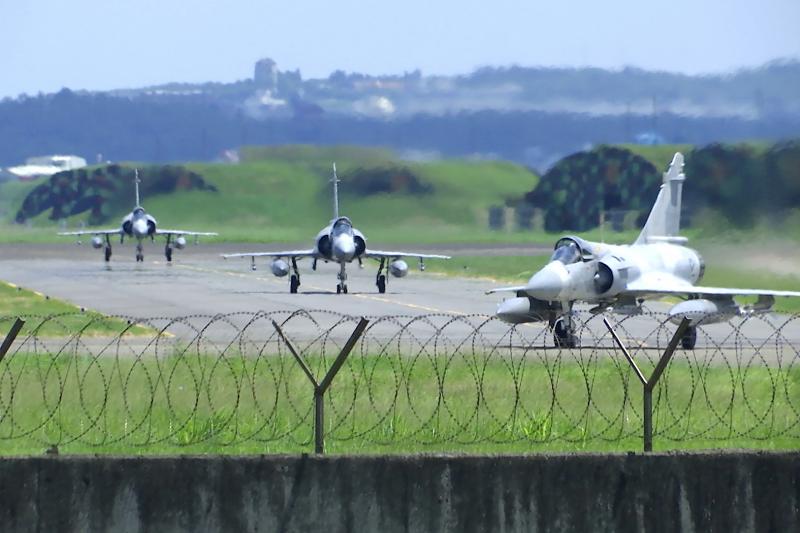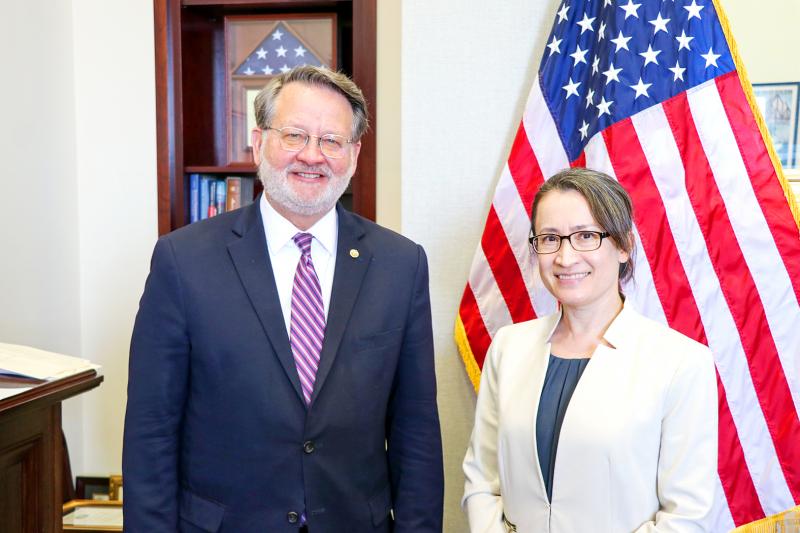President Tsai Ing-wen (蔡英文) yesterday said that China’s threat of force is undiminished, even though Beijing’s largest- ever military drills around the nation seemed to be scaling down.
Furious about a visit to Taipei by US House of Representatives Speaker Nancy Pelosi, China launched ballistic missiles and deployed multiple aircraft and warships in the past few days to simulate sea and air attacks.
China on Wednesday said it would keep up patrols, but had “completed various tasks” around Taiwan, signaling a possible end to the war games even while keeping up pressure.

Photo: Taiwan Presidential Office
Taiwan has also been conducting relatively small-scale, annual exercises, scheduled before the flare-up and aimed at preparing to repel an invasion.
“At present, the threat of Chinese military force has not decreased,” Tsai told air force officers, according to a statement released by the Presidential Office.
Taiwan will not escalate conflict nor provoke disputes, she was quoted as saying, while adding: “We will firmly defend our sovereignty and national security, and adhere to the line of defense of democracy and freedom.”

Photo:AP
“In the face of China’s recent military provocations, the nation’s armed forces are right on the front lines, and its duties will only be more onerous and the pressure will be even greater,” Tsai added.
Meanwhile, the Ministry of Foreign Affairs slammed Beijing’s release on Wednesday of a white paper in which it reaffirmed that it would not rule out using force to annex Taiwan.
“We are ready to create vast space for peaceful reunification, but we will leave no room for separatist activities in any form,” said the paper, the first it has issued on Taiwan since 2000.

Photo: Screen grab from the Twitter account of US Senator Gary Peters
Ministry spokeswoman Joanna Ou (歐江安) told a news conference in Taipei that Taiwan has been subjected to incessant provocations from China, including military threats, cyberattacks and the dissemination of misinformation.
The white paper by China’s Taiwan Affairs Office contradicts the reality that Taiwan and China are not subordinate to each other, while betraying Beijing’s intention to break international law by violating the other’s sovereignty, she said.
“Taiwan strongly condemns and protests [the white paper] as a crude piece of political machination,” she said.
“Taiwan’s sovereignty rests with its 23.5 million citizens, who are the sole arbiters of the country’s future,” she said. “This government will never accept any cross-strait framework that was dictated by authoritarian China.”
The surge of militarism and reckless behavior emanating from Beijing is ample proof that China is the true troublemaker and the root cause of instability in the region, she said.
“Taiwan solemnly demands that the Beijing regime cease its threats and lies at once, and that it would do well not to underestimate the Taiwanese will and ability to defend their homeland,” she said.
Meanwhile, Representative to the US Hsiao Bi-khim (蕭美琴) said in an interview on Wednesday that Taiwan would not be cowed by intimidation or surrender its hard-earned democracy to Beijing.
“The people of Taiwan are trying to carry on with our lives,” she told MSNBC News. “We have been seeing such threats from China for decades; this is not new to us.”
“Although the intensity of the recent exercises was truly alarming, we are not letting that affect the way we live our lives and our desire to breathe the air of freedom,” she said.
Beijing’s current strategy is to use “intimidation and coercion” to force Taiwan to accept its terms, which is the “one country, two systems” formula being utilized by the regime in its governance of Hong Kong, she said.
“Unfortunately, we have seen a tragic backslide of basic rights in Hong Kong, the deprivation of the freedom of speech, the freedom of association and the freedom of [the] press,” she said. “That is not what the people of Taiwan want.”
Hsiao called on Taiwan’s friends to stand with the country in opposing the China’s use of military, which harms not only peace in the Taiwan Strait, but around the world.
She also thanked US lawmakers for their bipartisan support of the Taiwan Policy Act.
The proposed legislation would provide Taiwan with effective instruments with which to defend itself and the world from wars of aggression, she said.

AIR SUPPORT: The Ministry of National Defense thanked the US for the delivery, adding that it was an indicator of the White House’s commitment to the Taiwan Relations Act Deputy Minister of National Defense Po Horng-huei (柏鴻輝) and Representative to the US Alexander Yui on Friday attended a delivery ceremony for the first of Taiwan’s long-awaited 66 F-16C/D Block 70 jets at a Lockheed Martin Corp factory in Greenville, South Carolina. “We are so proud to be the global home of the F-16 and to support Taiwan’s air defense capabilities,” US Representative William Timmons wrote on X, alongside a photograph of Taiwanese and US officials at the event. The F-16C/D Block 70 jets Taiwan ordered have the same capabilities as aircraft that had been upgraded to F-16Vs. The batch of Lockheed Martin

GRIDLOCK: The National Fire Agency’s Special Search and Rescue team is on standby to travel to the countries to help out with the rescue effort A powerful earthquake rocked Myanmar and neighboring Thailand yesterday, killing at least three people in Bangkok and burying dozens when a high-rise building under construction collapsed. Footage shared on social media from Myanmar’s second-largest city showed widespread destruction, raising fears that many were trapped under the rubble or killed. The magnitude 7.7 earthquake, with an epicenter near Mandalay in Myanmar, struck at midday and was followed by a strong magnitude 6.4 aftershock. The extent of death, injury and destruction — especially in Myanmar, which is embroiled in a civil war and where information is tightly controlled at the best of times —

Taiwan was ranked the fourth-safest country in the world with a score of 82.9, trailing only Andorra, the United Arab Emirates and Qatar in Numbeo’s Safety Index by Country report. Taiwan’s score improved by 0.1 points compared with last year’s mid-year report, which had Taiwan fourth with a score of 82.8. However, both scores were lower than in last year’s first review, when Taiwan scored 83.3, and are a long way from when Taiwan was named the second-safest country in the world in 2021, scoring 84.8. Taiwan ranked higher than Singapore in ninth with a score of 77.4 and Japan in 10th with

China's military today said it began joint army, navy and rocket force exercises around Taiwan to "serve as a stern warning and powerful deterrent against Taiwanese independence," calling President William Lai (賴清德) a "parasite." The exercises come after Lai called Beijing a "foreign hostile force" last month. More than 10 Chinese military ships approached close to Taiwan's 24 nautical mile (44.4km) contiguous zone this morning and Taiwan sent its own warships to respond, two senior Taiwanese officials said. Taiwan has not yet detected any live fire by the Chinese military so far, one of the officials said. The drills took place after US Secretary